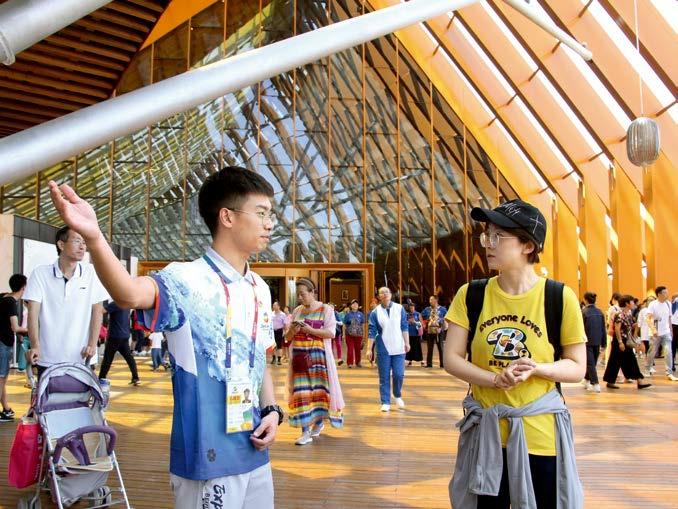Volunteers Make It Possible
2019-12-27byNathanBennett
by Nathan Bennett
To make the Beijing International Horticultural Exhibition (hereinafter Beijing Expo) a success, many contributions were necessary: multiple levels of government support, international botanical expertise, technological design and construction labor. This article is looking at the front-line personnel who made it easy to visit the Beijing Expo and take in all that the Expo had to offer: the volunteers.
Volunteer Selection and Training
The main body of volunteers at the Beijing Expo came up from Beijing universities to serve for a week at a time. There was also cooperation between the governments of Zhangjiakou City, one of the hosts of the 2022 Winter Olympics, and Yanqing District, where the Beijing Expo was located. Recruitment was run through the Beijing Volunteer Service Federation and the youth associations at various universities. Online announcements through web portals attracted students to sign up and go through rounds of interviews, in which they were screened for overall competence and special skills they could contribute to the Beijing Expo.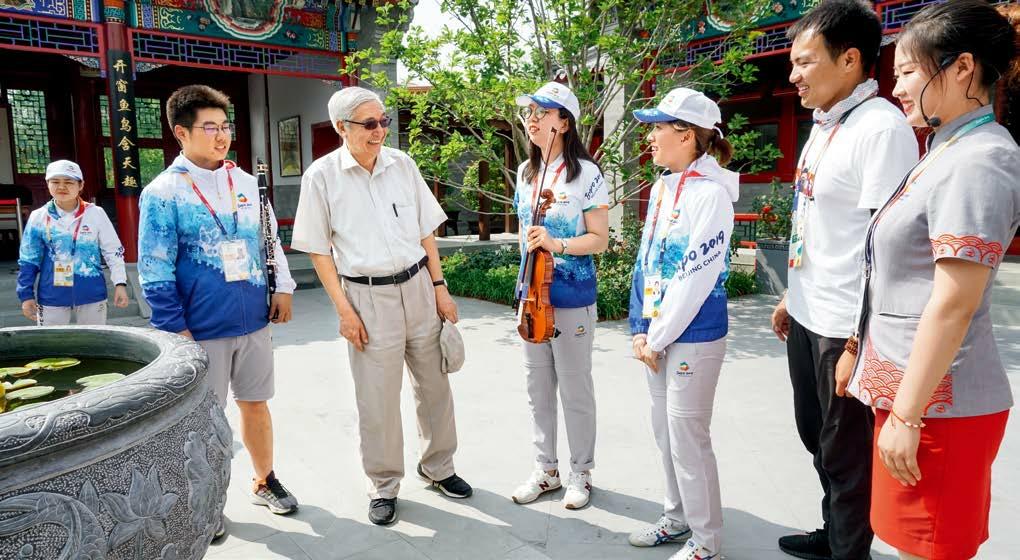
The general training that volunteers received began with videos and reading delivered online, prior to coming to the park for on-site volunteer training. They studied topics such as maps of the park, volunteer duties, visitor greeting etiquette, emergency procedures, and media relations requirements. Training began weeks or months before they actually went to the park to volunteer, and was completed in the first three days of a volunteers seven days of service. Some volunteers were fully trained when they arrived at the park to serve, so they began serving right from their arrival. Specialist volunteers like musicians did not undergo the same training because their roles were more limited.
Special medical teams went through three days of training to meet common medical emergencies. This enabled people of all ages to comfortably visit the park. The vast open stretches of the Beijing Expo and the specially designed gardens broadly distributed through the park meant that people using step counters could easily rack up 10,000 to 15,000 steps just in a short visit, so knowing that first aid personnel were on hand helped visitors confidently tour the park.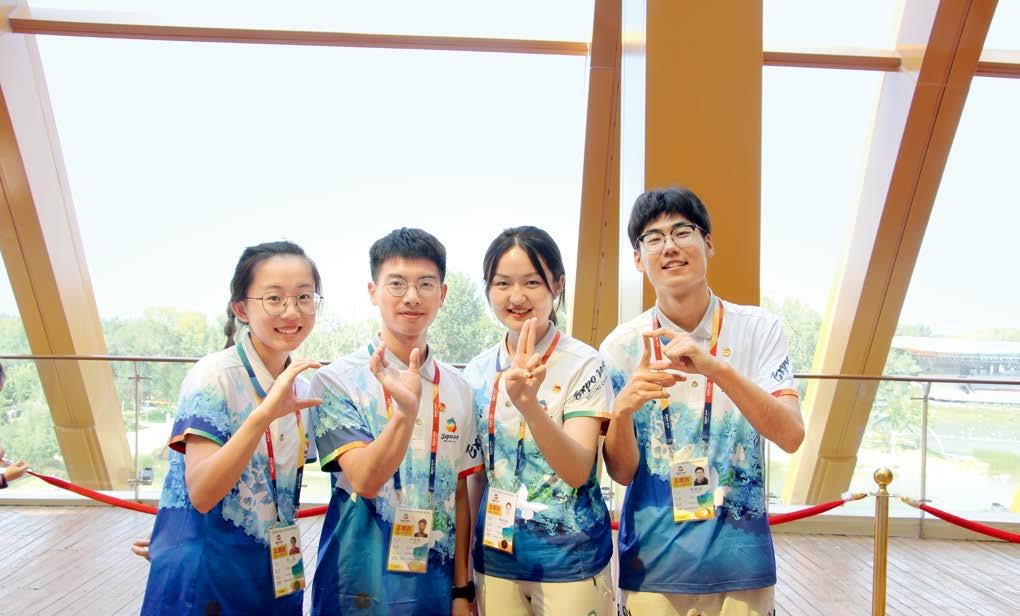
Volunteer Experiences
Several volunteers from different areas of the park contributed some of their stories related to different aspects of their service. They shared some of the most interesting things they saw, difficult things they had to do, and ultimately why they wanted to serve and what they hoped to get from serving.
One common thread in what volunteers shared was the need to constantly study up on the names of plants they introduced to visitors and architectural details of the buildings containing various exhibits. Volunteers serving specifically as tour guides had to develop and memorize specialized scripts for introducing visitors to the various exhibits, and they had to be ready for further questions. They accumulated pages of notes and passed them on to the next round of volunteers who came the next week to replace them.
Working with the public was not always easy. Wen Zhichun, a volunteer from Zhangjiakou, said that the large size of the park meant that people who came to him for assistance would be tired and cranky, so he had to talk them down and put their minds at ease before he could deal with their questions. However, for him, the opportunity to “people watch” from his post in the visitor assistance booth gave him some enjoyable sights. For him it was always fun to see large groups of visitors, possibly family, and the fast walkers would often turn around and tell the slow people in back to speed up. As anyone with customer service experience knows, serving people can be a grueling experience but it ultimately builds up ones abilities to help many kinds of people.
Volunteers occasionally had special skills to contribute. There was the violin player Li Xinyao who contributed her skills to the Beijing Expo. One group of volunteers who had several skills to offer was from the International Pavilion, comprised of students and leaders from Beijing University of Chinese Medicine. Pei Xiaoxue signed up as a general volunteer, but she contributed an auxiliary function as a sign language interpreter for hearing impaired persons. Han Yizhen, majoring in traditional Chinese medicine, enjoyed using her skills to serve visitors dealing with some discomfort as they toured the park.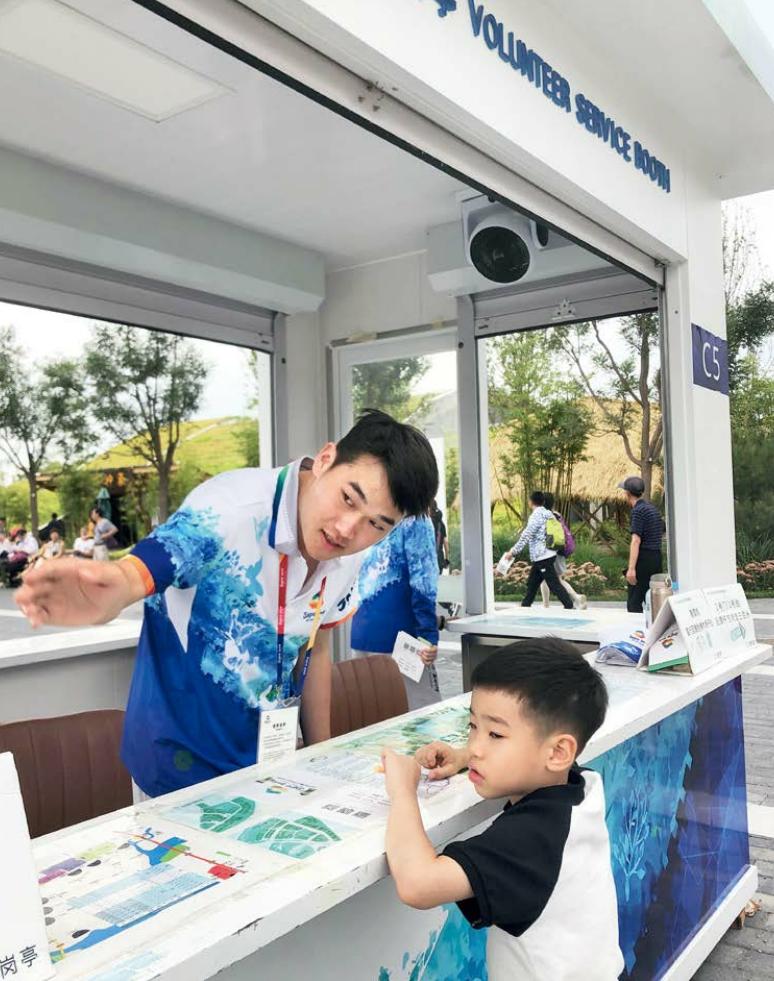
Two leaders for the volunteer group from Beijing University of Chinese Medicine were the teacher Zhang Li and the student volunteer leader Chang Hui. They were respectively the leaders of the male and female volunteers. For both, managing volunteers proved to be a challenge. They reported that volunteers would go out on duty even when they were sick, so they would have to force them to rest. Chang cited the extreme size of the park as a difficulty, and all the walking required was tiresome for volunteers going out to their posts, coming back for meals, returning to their posts, and coming back at the end of the day. Zhang noted that, for a teacher, managing 200 to 300 students for a week is a real test of management abilities. Chang stated that, for her, because she is studying management, the opportunity to put theory into practice in managing personnel at a large event was a bonus.
The Big Picture of Volunteering
The willingness to pitch in and lend a helping hand is part of what keeps any society together. Volunteers gained practical experience working with and serving others, and that will benefit them in their lives long after the Beijing Expo. They gained enhanced teamwork and communication skills which will broadly improve their future careers and relationships. Broader society will benefit from having a base of experienced volunteers potentially ready to contribute their service skills for future social efforts.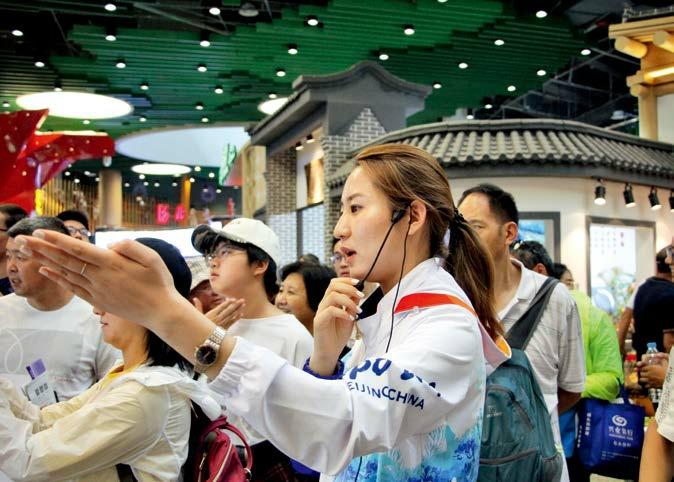
Even though young volunteers in many countries may initially offer only perfunctory service to help future applications for graduate school or career advancement, they get the opportunity to buy into the larger life of their communities and nations. Volunteering means taking ownership of ones citizenship, bearing adult responsibility and earning the privileges of membership in a nation.
The volunteers at the Beijing Expo expressed enthusiasm to share volunteer spirit and contribute to their communities. Where there were difficulties, those werent the foremost memories of their service experience. With the success of the Expo, the volunteers are not merely disposing of a petty obligation but are buying into their countrys future and enjoying the process of their own growth and transformation as human beings.